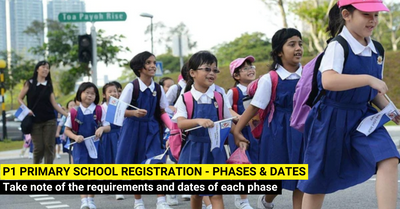We speak with Ms Saradha Ramachandran, Master Counsellor, HELP Family Service Centre, on her thoughts about successful co-parenting.

Sometimes a marriage breaks down and the couple chooses not to be together. However the remain parents to their child, so how can couple who are no longer together move forward successfully as a family.

Ms Saradha Ramachandran is a member of Focal Area ‘Support for Single Parents’, under the Alliance for Action to Strengthen Marriages and Family Relationships, and Master Counsellor, HELP Family Service Centre.
*This article is done in collaboration with the Ministry of Social and Family Development (MSF)
- What is the definition of co-parenting?
Divorce ends the marital relationship between the couple. However, they are going to be parents forever to their children. Co-parenting refers to the way the parents share responsibilities in bringing up their children after the divorce and ensuring that the children’s needs and welfare are met. Children of divorced parents adapt better when parents can talk to each other cordially and work together on the children’s matters.
- How can the parents manage their issues and their children’s matters effectively?
Divorce and the adjustments to the divorce can be stressful for the parents and children as they need to manage the changes and the associated uncertainties with it. It is also the time when they need to manage a host of emotions associated with unmet expectations, hopes, and dreams due to the divorce.
There may be situations when these emotions affect the ability of parents to make informed decisions about the divorce, keeping in mind the best interest of the children.
Sometimes, the children get caught in the adult issues and have difficulties managing these situations. It is important for parents to first identify and acknowledge these challenges.
Then, to seek support in extended family, friends, or professionals to make sense of what they are going through and find effective ways of managing their emotions and challenges. It is important for parents to understand their children and identify their children’s needs.
For example, the children may need support in managing their adjustment to the changes and routines at home, relationship with others, academics, self-care etc. Then, the parents can look into the different possibilities of sharing responsibilities in supporting the children and meeting their needs.
- What are some of the common challenges you’ve seen in divorced couples regarding parenting?
In some situations, the high level of conflict and hostility between the parents make it difficult for them to communicate effectively on children matters, and this has an impact on the children.
Some parents are fearful of losing contact or having limited interaction with their children. They are concerned about the effects of these limitations on their role as parents and their involvement in the children’s lives and development.
The parents may have different parenting styles and expectations about supporting the children after the divorce, which could lead to confusion in children and affect their adjustment to the divorce.
If parents can reach an agreement on children matters, it will help to establish stability and routine for the children’s lives. It also helps to reduce misunderstanding and confusion between the parents. These would facilitate overall well-being and growth of the children.
- What are some approaches or tips in adopting a cooperative co-parenting arrangement?
Cooperative co-parenting is associated with positive outcomes for children. It is characterised by parents who communicate frequently and collaborate with each other to plan and make decisions about their children together.
Some of the useful tips to facilitate cooperative co-parenting are as follows:
- Focus on what is best for the children
- Acknowledge that we are good enough parents even though we may not have been good enough spouses. Perceive the other parent as a “parent” rather than “ex-spouse”.
- Prioritise the best interests and well-being of the children. All parents are concerned about the child’s well-being and want to support them. Focus on the child’s needs when communicating with the other parent.
- Plan a co-parenting schedule
- Parents are encouraged to come up with a co-parenting schedule. The schedule could include the children’s extracurricular activities, time with each parent, transportation arrangement, medical appointments if any, liaison with the school, and updating each other on children’s matters, etc. It is also important that parents learn to give and take and be flexible.
- Be consistent on rules and discipline
- Consistency in rules and discipline is important. If there are different rules and discipline in different households, it can be confusing for the children. Consistent discipline and consequences across different households will prevent adjustment difficulties, and development of behavioural issues. It will also help children to have clarity on what is acceptable behaviour.
- Have respectful communication
- Have respectful communication without undermining the other parent. Agree on a preferred mode of communication. If the face-to-face interaction with the other parent is difficult, you may want to use emails, messages, or phone contact.
- Be mindful of the language and tone as well. At times, it will be helpful for parents to write down what they want to discuss, so that they could be focused, and can discuss one issue at a time. For example, the communication can be like, “Our child has a CCA team bonding activity on this Saturday during the access. What can we do to support our child with both the activity and the access?”
- Take a pause/time-out when communications do not facilitate reaching an agreement.
- Seek professional support
- Seek support with a professional when you are unable to reach an agreement with the other parent on children matters.
- Manage your emotions by seeking professional support or engaging in activities that calm you down. Do not allow your emotions due to the divorce affect making informed decisions about the children.
- Tap onto community resources. Strengthening Families Programme @Family Service Centres, FAM@FSCs and Divorce Support Specialist Agencies provide divorce related services and programmes for families. You may visit https://familyassist.msf.gov.sg/content/resources/where-can-i-attend-counselling-and-programmes/our-agencies/) and https://familyassist.msf.gov.sg, an online resource portal that provides information and support related to divorce.







